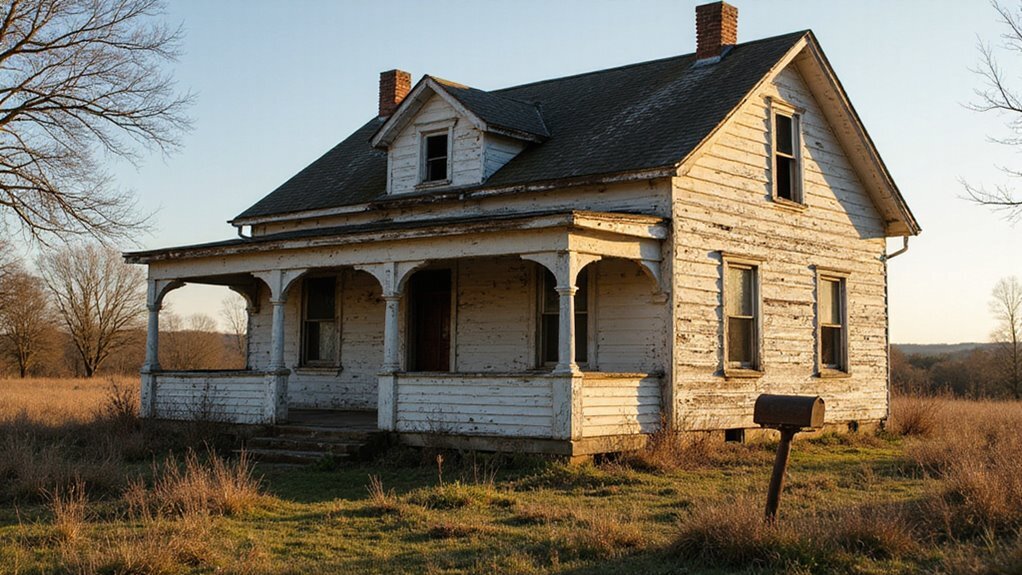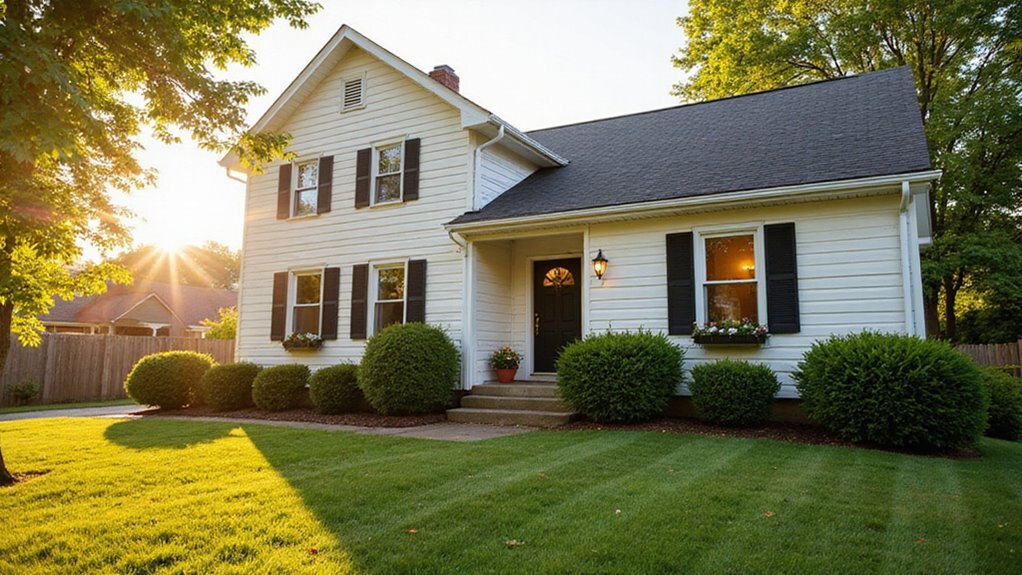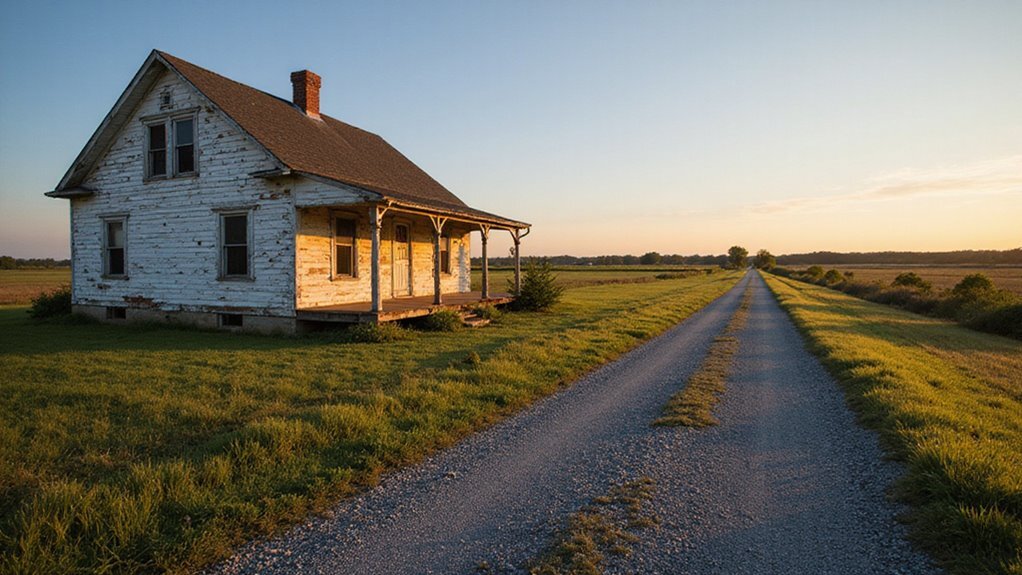Struggling to Sell a Vacant or Abandoned House in Kentucky?
Picture your empty Kentucky house sitting idle while bills pile up and its condition deteriorates daily. Vacant properties drain your finances through ongoing taxes, insurance, and maintenance costs that never stop coming. Worse yet, abandoned homes attract vandalism, squatters, and legal troubles that complicate any future sale attempts. Act quickly with proper preparation, legal compliance, and strategic selling methods.
To sell a vacant or abandoned house in Kentucky, secure the property first and resolve all legal issues. Update taxes, clear hazards, and choose your selling method: agent, investor, or auction. Price competitively based on condition and market research.
In this guide I will explore everything related to selling a vacant or abandoned house in Kentucky.
Key Takeaways
- Confirm ownership, clear title, and settle overdue taxes before listing or selling the property.
- Address maintenance, security, and code violations to improve marketability and compliance.
- Choose the appropriate sale method: traditional listing, auction, or selling to cash investors.
- Disclose all hazards, violations, and known defects to ensure legal compliance and transparency.
- Consider engaging reputable cash buyers for quick, as-is sales, especially for abandoned or distressed properties.
What Is a Vacant or Abandoned House?

A vacant house is unoccupied but still legally owned, while an abandoned property has been relinquished or left in violation of local laws. Common causes include foreclosure, job loss, or neglect, which can lead to safety issues.
Owning such properties carries risks like vandalism, arson, and depreciation that you need to consider before selling.
Legal Definitions of Vacant vs. Abandoned
Vacant properties remain unoccupied but legally owned and maintained. Abandoned houses are legally declared vacant, unsafe, and tax-delinquent under KRS Chapter 99.600. The key difference lies in legal status and property condition.
Vacant homes keep full ownership rights without code violations. In contrast, abandoned properties face enforcement action and potential ownership loss.
Kentucky law requires all three conditions—vacancy, unsafe status, and tax delinquency—for abandonment designation.
This distinction determines your legal obligations and sale strategy when dealing with unoccupied real estate.
Common Causes of Property Abandonment
What causes property owners to abandon homes in Kentucky? Foreclosure is the leading cause, forcing owners to leave when mortgage payments become unmanageable.
Financial hardship from job loss or medical bills also drives abandonment. Serious code violations make some properties too expensive to repair.
Death of an owner without heirs creates another common scenario. Properties sit vacant when families can’t afford upkeep or coordinate sales. Each situation leaves homes vulnerable to decay and vandalism.
Potential Risks of Owning Vacant Property
Vacant properties in Kentucky create serious problems for owners and communities. These buildings attract vandalism, illegal activity, and squatters.
Structural damage worsens quickly without regular maintenance. Property owners face fines and legal action if they ignore these issues. Local authorities may intervene and force repairs.
Unmaintained buildings also pose safety hazards to neighbors. Take action now to protect your investment and avoid penalties.

“Brian with Ky Sell Now couldn’t have been any better to deal with. The offer was reasonable, they did what they said they would do, and did it when they said they would do it. Terms were good and they were flexible meeting our terms and needs.“
David Weinberg
Why Is Selling a Vacant House Challenging?
Selling a vacant house in Kentucky is tough because security and maintenance issues can raise red flags for buyers and inspectors. Many see vacant properties as risky, which can hurt your chances of a quick sale.
Plus, the financial burdens of keeping the property up-to-date often fall on you, making the process even more challenging.
Security and Maintenance Issues
Vacant houses attract crime and deteriorate quickly without proper care. You must secure all entry points and consider installing cameras or alarm systems.
Empty properties become targets for vandalism, theft, and squatters. Regular maintenance prevents these problems and protects your investment.
Beyond security concerns, neglected properties lose value rapidly. Overgrown lawns and visible disrepair signal abandonment to criminals.
Buyers and lenders reject poorly maintained homes, making sales nearly impossible. Consistent upkeep demonstrates responsibility and keeps your property marketable.
Perception Problems for Buyers
Vacant homes trigger buyer skepticism immediately. Most assume the property has serious hidden damage or code violations. They fear unexpected repair costs and safety hazards.
Your transparency solves this problem directly. Provide detailed maintenance records and recent inspection reports upfront.
Condition disclosures must list all known issues honestly. Show proof of repairs or improvements you’ve completed.
Buyers need reassurance, not perfection. Address their concerns before they ask. Clear documentation builds confidence and leads to better offers.
Financial Burdens of Vacant Properties
Vacant properties create serious financial problems that block quick sales. Property taxes pile up fast, especially when back taxes go unpaid. These unpaid amounts can trigger liens or foreclosure proceedings. As a result, ownership transfer becomes far more complicated.
Beyond taxes, you face ongoing maintenance costs and insurance premiums. Code violations may bring additional fines from local authorities. All these debts must be cleared before closing. Without addressing them early, your sale will likely stall or fail completely.
How to Prepare a Vacant House for Sale?

To prepare your vacant house for sale, you need to secure the property by locking doors and windows and complying with local codes.
Address any maintenance issues, like repairs or yard cleanup, to make the home more appealing. Finally, consider staging strategies and managing utilities to showcase the property’s potential and ease inspections.
Securing the Property
A vacant house needs protection from break-ins, vandalism, and weather damage. Start by installing deadbolts on all doors and windows. Board up any broken windows to block entry points.
Keep the lawn mowed and remove debris from the yard. This simple step discourages squatters and vandals.
Add security cameras or motion-sensor lights if your budget allows. These measures preserve the property’s value and prevent costly repairs during the sale process.
Addressing Maintenance Issues
Address deferred maintenance before listing your property. Conduct a thorough inspection to spot structural issues, leaks, and safety hazards. Fix code violations immediately to avoid fines and sale delays.
Clean up debris and secure all entry points. Maintain the lawn to prevent squatters and vandalism. These steps protect your investment and demonstrate value to buyers.
Properties meeting Kentucky’s occupancy standards sell faster. Proper upkeep reduces liability risks and builds buyer confidence. Your commitment to maintenance directly impacts sale price and closing speed.
Staging Strategies for Empty Houses
Empty homes sell faster when staged properly. Buyers struggle to visualize potential in vacant spaces. Start with a thorough cleaning and complete all necessary repairs. These basics create a positive first impression.
Add neutral furniture in key rooms like the living room and master bedroom. This helps buyers picture their daily life in the space. Open all curtains to maximize natural light. Replace any broken fixtures immediately.
Keep utilities running during showings and inspections. This proves the home functions properly and feels move-in ready.
Managing Utility Services
Should you keep utilities on in a vacant house for sale? Yes. Active utilities protect your property and attract buyers. They prevent damage from frozen pipes, mold growth, and security system failures.
Maintain water, electric, and gas service throughout the selling period. This allows inspectors to test all systems properly. Additionally, buyers can envision themselves in a fully functional home during showings.
Schedule regular inspections to catch problems early. Document all utility account details for accurate property disclosures.
These steps demonstrate responsible ownership and reduce buyer concerns about hidden issues.

“Brian was so easy to work with. They were quick and efficient. After several months of working with another buyer without closing the deal, we are thankful to have found him. We were able to get a deal done and finalized in just a matter of weeks! I would recommend Kentucky Sell Now to anyone.”
What Are the Legal Considerations?
Before selling, you need to verify your ownership and ensure the title is clear to avoid legal issues.
You also have to consider property tax obligations and comply with local vacant property ordinances to prevent fines or forced sales.
Additionally, full disclosure of any hazards or code violations is required to meet Kentucky’s legal standards.
Title and Ownership Verification
You must verify the property title before selling any vacant or abandoned property in Kentucky. This protects you from legal problems and delays.
Start by checking the county recorder’s office for current deed records. Look for any liens, judgments, or claims against the property.
Review probate or estate issues if ownership seems unclear. As a result, you can confirm clear title and legal authority to sell.
Property Tax Implications
Unpaid property taxes create liens that prevent you from transferring clear title to buyers. You must pay all overdue taxes before closing the sale. Tax liens give the county legal claim to your property until the debt is settled. Check your property’s tax status at the county clerk’s office first.
Outstanding taxes can lead to foreclosure if left unpaid for extended periods. Clear all liens early to avoid delays. This protects both you and potential buyers from legal complications during the transaction.
Local Vacant Property Ordinances
Local ordinances in Kentucky require property owners to register vacant homes and maintain them properly. These laws protect neighborhoods from safety hazards and blight. Property owners face strict deadlines and standards they must meet.
Violations result in fines, condemnation proceedings, or forced sales. Municipal authorities can take over properties when owners fail to comply.
These enforcement measures ensure abandoned buildings don’t harm surrounding communities. Following these regulations protects your investment and supports neighborhood stability.
Disclosure Requirements
Yes, you must disclose all known defects when selling a vacant or abandoned house in Kentucky. This protects buyers and keeps you legally safe.
Kentucky law requires sellers to reveal issues affecting property value or safety. These include structural damage, environmental hazards, and code violations.
Honest disclosure prevents future lawsuits. Buyers deserve to know what they’re purchasing.
Failing to disclose known problems can result in legal liability. Complete transparency builds trust and ensures a smoother transaction for everyone involved.
What Are Your Selling Options?

You have several options for selling your vacant or abandoned property in Kentucky.
You can list it traditionally through a real estate agent, sell at auction, or pursue cash buyers who often close quickly.
Owner financing and donations to nonprofits are also possible strategies to consider.
Traditional Real Estate Listing
List your Kentucky property through a licensed real estate agent. They handle pricing, marketing, and buyer negotiations for you. Most agents charge 15-20% commission on the final sale price.
Your agent will assess the property’s condition and recommend repairs. Professional photos and virtual tours help attract serious buyers. In fact, staged homes typically sell faster than unstaged ones.
Be upfront about any damage or legal issues with the property. Transparency builds buyer trust and prevents deal complications later.
Auction Processes
Auctions sell vacant or abandoned Kentucky properties fast when traditional sales fail. You reach serious buyers quickly and complete transactions efficiently. This method works well for multiple properties or urgent sales.
Prepare the property, set a reserve price, and follow county auction rules. The transparent process ensures compliance with local ordinances.
Successful auctions transfer ownership promptly, reducing liability risks. Communities benefit as unsafe structures get removed and properties return to productive use through redevelopment or responsible ownership.
Cash Home Buyers
Cash home buyers purchase properties directly with immediate funds and close within days. You avoid repairs, showings, and lengthy mortgage approvals. Most transactions complete in 7–14 days.
Four main options exist for sellers. Cash investors buy homes in any condition for quick closings. Local companies focus specifically on abandoned properties throughout Kentucky.
Online platforms match you with verified buyers in your area. Real estate wholesalers handle paperwork and coordinate fast sales.
This method eliminates waiting periods and reduces holding costs. You receive guaranteed funds without contingencies or buyer financing issues.
Owner Financing Possibilities
Owner financing lets you act as the lender when selling your Kentucky property. The buyer makes monthly payments directly to you instead of getting a bank loan. This arrangement helps buyers who struggle with traditional mortgage approval.
You earn interest income over time while helping someone achieve homeownership.
The buyer typically makes a down payment of 10-20% upfront. Your property sells faster since you don’t wait for bank approvals. Both parties benefit from flexible terms and a quicker closing process.
Donating the Property
Yes, you can donate your vacant or abandoned property to a qualified nonprofit organization. This option eliminates the hassle of selling while supporting community housing initiatives.
The property must have a clear title before donation. A title company can help resolve any liens or legal issues.
Most nonprofits have specific acceptance criteria for vacant properties, so confirm requirements first.
Request a receipt for potential tax deduction purposes. This simple process benefits your community and removes the burden of property ownership.
How to Price a Vacant or Abandoned Property?
To price a vacant or abandoned property in Kentucky, you need to consider its market value based on local assessments and recent sales.
You should also evaluate the property’s condition and estimate repair costs to adjust the price accordingly.
Setting a competitive price involves balancing these factors to attract buyers while covering your expenses.
Market Value Assessment Factors
Market value depends on these main factors. County records show the current assessed value as your starting point.
The property’s visible condition reveals how much repair work you’ll need. Comparable sales in the area tell you what buyers are willing to pay.
Beyond these basics, renovation costs significantly impact final value. Calculate expenses for structural fixes and upgrades.
These numbers help you determine if the investment makes financial sense for your situation.
Condition-Based Pricing Strategies
You must assess repair needs and structural damage before setting your price. Bank-owned properties typically require significant condition adjustments to attract buyers. Calculate repair costs for issues like foundation problems, code violations, and safety hazards.
Then subtract these amounts from comparable home values in your area. This method protects you from overpricing while giving buyers realistic expectations.
Accurate condition-based pricing generates serious offers quickly. It also meets Kentucky market standards and legal disclosure requirements.
Accounting for Renovation Costs
Subtract all repair expenses from the property’s after-repair value to determine your maximum purchase price. This calculation protects you from overpaying.
Start by assessing structural, electrical, and plumbing repairs. These systems require priority attention. Next, estimate exterior work like roofing and siding.
Don’t forget interior updates including flooring, paint, and fixtures. Finally, add permit fees and labor costs to your total. This complete picture ensures accurate pricing and helps buyers understand the true investment needed.
Setting Competitive Pricing
Price your property based on three key factors:
- Current market conditions,
- Property condition, and
- Recent comparable sales in your area.
This approach attracts serious buyers and generates fair offers quickly.
Properties needing repairs should reflect renovation costs in the asking price. Research what similar homes sold for recently. Then adjust your price down if your property needs work.
Competitive pricing prevents extended vacancies and speeds up the sale process. A well-priced property benefits both you and potential buyers while reducing holding costs.
Ready to Sell Your Vacant Home Fast for Cash?
You can sell your vacant home fast for cash to investor buyers. Cash home buyers purchase properties quickly, often within 7–14 days. They buy homes as-is without requiring repairs.
Clean the property and secure all entry points first. This step meets local code requirements. Full disclosure about property issues builds trust with buyers. Contact reputable cash buyers who specialize in Kentucky vacant properties.
Investor buyers value rehab potential over current condition. They offer straightforward transactions with fewer complications. This option works well when you need to move on quickly. Want to sell your vacant home fast for cash? Contact Kentucky Sell Now. We buy houses for cash.
Can I sell a vacant or abandoned house “as-is” in Kentucky?
Yes, you can sell it “as-is,” meaning you don’t need to make repairs before listing or selling.
Do I need to disclose property issues if the house is abandoned?
Yes. Kentucky law requires sellers to disclose known defects or damage, even for vacant or abandoned properties.
Will leaving a house vacant affect its value?
Yes. Vacant homes often decline in value due to neglect, vandalism, or weather damage without regular upkeep.
How can I attract buyers for a vacant home in Kentucky?
Clean the property, secure it, maintain curb appeal, and market it to cash buyers or investors.
Can I sell a vacant or abandoned home to a cash buyer?
Absolutely. Cash buyers often purchase vacant or abandoned homes quickly, avoiding the delays of traditional listings.
Sell Your House Fast in Louisville 💰
We buy houses in Louisville As-Is! No Hidden Fees or Real Estate Commissions. Sell Your House in Louisville And Close On The Date Of Your Choice. Simply Fill Out The Form, or call (502) 610-0070 today!

